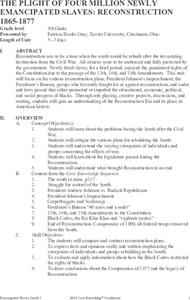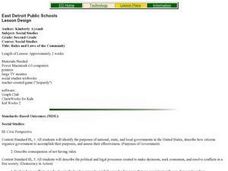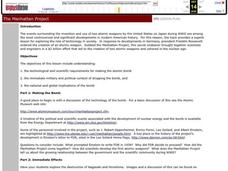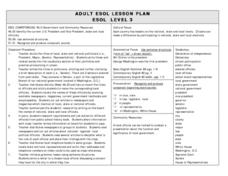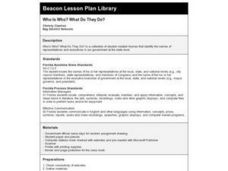PBS
Universal Declaration of Human Rights
What rights are guaranteed to students? Do they align with the Universal Declaration of Human Rights, which was approved by the United Nations in 1948? Middle and high schoolers present persuasive arguments about the rights they believe...
Curated OER
Money and Business (Art)
Third graders investigate world currency by creating their own coin art. For this government lesson, 3rd graders examine the characteristics of different coins and create their own design for a new one. Students discuss and...
Curated OER
Cartoons for the Classroom: Stand by for Regime Change
For this current events worksheet, students analyze a political cartoon about the lame-duck period for Presidents-elect and respond to 3 talking point questions.
Curated OER
The Role of Individuals and Groups in the Census
Students learn why the census makes a difference. In this U.S. Census lesson plan, students describe and explain the roles that individuals, government agencies, and partner groups play in the census.
Curated OER
Fourth Grade Social Studies
In this social studies worksheet, 4th graders answer multiple choice questions about George Washington, early America, natural resources, and more. Students complete 8 questions.
PBS
The Big Picture-Economic Security in the Country and your Community
High schoolers explore economic security at the local and national level during the time period preceding the 2008 presidential election. They fill out surveys on their thoughts and concerns regarding the US economy, and watch...
Curated OER
Death and Taxes
Students explore the "death tax" and analyze statistical information about how the government taxes dead people. They research sources to determine the validity of a anti-tax group campaign and John McCain's claims about taxes. ...
Curated OER
The Plight of Four Million Newly Emancipated Slaves: Reconstruction - 1865-1877
Students study the Reconstruction Era after the US Civil War. In this Reconstruction lesson set, students examine the problems that were encountered by the South after the Civil War, look at different plans for Reconstruction, and...
Curated OER
The failure of Diplomacy, September-December 1941
Students investigate four main issues of concern between US and Japan prior to US involvement in World War II. In this role play activity, students will take the role of US and Japanese negotiators trying to find a diplomatic solution to...
Curated OER
A Miniscule Adversary: Combating Epidemics and Infectious Diseases in America
Tenth graders discover the spread of different diseases in US. In this health science lesson, 10th graders research the role of CDC and PHS in protecting the citizens. They explore documented cases of pandemics and their impact on...
Curated OER
Women's History Week
Learners investigate the contributions of women who influenced human rights in US history. They examine the influence Susan B. Anthony, Harriet Tubman, Sojourner Truth and Elizabeth Cady Stanton by participating in a jigsaw activity....
Curated OER
The Battle of the Battlefields
Middle schoolers simulate the role of a presidential analysis group to research a location for a Revolutionary War museum. They conduct research, and write a summary of their findings to present to the President.
Curated OER
Rules and Laws of the Community
Second graders recognize and identify the need for rules in school. They also discuss the importance of safety rules at school, home, and in the community. They illustrate a rule which they have learned in class, and write letters to the...
Curated OER
The War of 1812
A good addition to a unit on the War of 1812, this slideshow details causes, specific battles, political contexts, and several campaigns of the war. Maps and pictures with broad topics allow teachers to bring their own discussion topics...
Curated OER
The Manhattan Project
Students discover the technological and scientific requirements for making the atomic bomb, the immediate effects of an atomic bomb, and the social and political changes that have resulted from the Manhattan Project.
Curated OER
Who Are Your Local Officials?
Students identify the names and positions held by local public officials. In pairs, students research the requirements and duties needed to hold office. A brief presentation of their research will include the names and positions of...
Curated OER
Cuban Missile Crisis
Seventh graders explore, analyze and study all the various aspects that happened concerning the Cuban Missile Crisis. They assess documents from the Cuban Missile Crisis and make decisions about what the United States should do based on...
Curated OER
The Alien and Sedition Acts: Defining American Freedom
Eleventh graders explore the purpose of the Alien and Sedition Acts. In this US History lesson plan, 11th graders analyze primary source documents. Students write an essay using writing prompts.
Curated OER
Who Is Who? What Do They Do?
Second graders create rhymes in order to remember the names of representatives and executives in our government at the state level.
Curated OER
The Navajo Homeland
Pupils identify the historical and traditional location of the Navajo Homeland. They study the four original clans system and the development of other adopted clans, e.g. Nakai Dine (Mexican), Notahi Dine(Ute), Ozii Dine (Hopi); and,...
Curated OER
Over the Borderline?
Students study President Bush's proposal for immigration policy in the US and examine various perspectives on immigration that are currently being debated. They read and discuss an online New York Times article.
Curated OER
Press Freedom Versus Military Censorship
Eleventh graders explore the term terrorism. In this US History lesson plan, 11th graders participate in a press release on terrorism.
Curated OER
Using Current Events to Understand Elections
Eleventh graders explore the the major phases of the electoral process for president. For this US Government lesson, 11th graders compare and contrast the delegate system of nomination and the electoral college.
Curated OER
When is Humanitarian Intervention Justified?
Learners analyze different foreign policies to derive their own idea of what constitutes appropriate intervention by a government. They complete a detailed proposal for their own Declaration of Human Rights.







